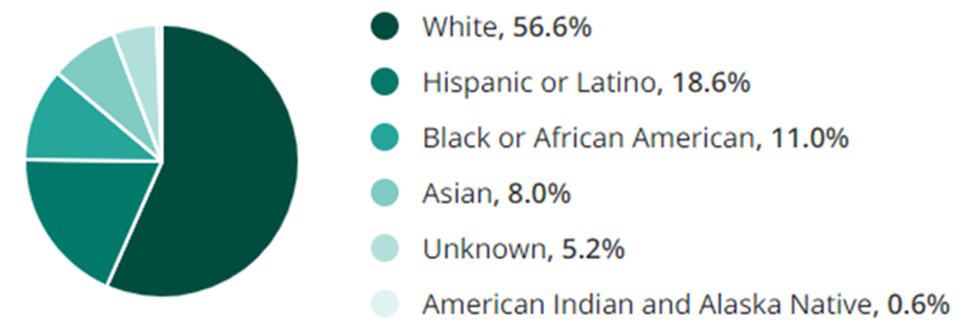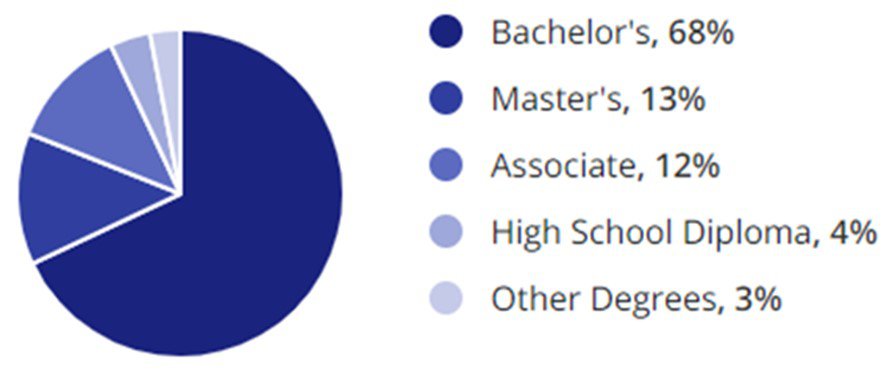Welcome to your definitive guide on carving a successful career in Human Resources. Whether you’re just starting your journey or looking to advance further, this guide provides invaluable insights into the dynamic field of Human Resources. The role of HR professionals is evolving – from managing recruitment and compliance to shaping organizational culture and fostering a diverse and inclusive work environment. As such, the demand for skilled and dedicated HR professionals is rising.
In this guide, you’ll discover the educational paths that can lead you to a rewarding HR career, dive into the various areas of expertise within HR, and explore the demographics shaping the current workforce in the United States. We’ll also look at salary trends, hiring trends, the most sought-after skills in the industry, and what the future holds for those pursuing Human Resources Jobs. Plus, we’ll answer some of the most frequently asked questions and provide additional resources to help you on your journey.
Human Resources is not just about managing workforce-related functions; it’s about being at the heart of an organization’s success, advocating for employee well-being, and playing a crucial role in creating a workplace where everyone can thrive. If you’re passionate about making a difference and eager to contribute to the success of diverse teams, a career in Human Resources offers a fulfilling path.
Let’s embark on this journey together and explore how you can turn your passion for people into a thriving career in Human Resources.
Educational Requirements
Starting a career in human resources jobs usually means getting a bachelor’s degree in human resources, business administration, or closely related fields. These degrees lay the groundwork, teaching you the essentials of employee relations, labor laws, and organizational psychology. Further, enhancing your credentials with certifications like the Professional in Human Resources (PHR) or the Senior Professional in Human Resources (SPHR) can significantly boost your profile. Certifications are not just about adding titles next to your name; they signal to potential employers your dedication to the profession and expertise in handling complex HR issues. Diving into specialized training and certifications in diversity, equity, and inclusion can be particularly advantageous for those looking to highlight their readiness for diverse workplace environments and to excel in roles such as human resource assistant jobs or human resource director jobs.
Areas of Expertise
Human Resources is vast, offering a wide range of specializations catering to different interests and skills. Here are some primary areas of expertise:
- Recruitment and Staffing: This area focuses on attracting, screening, and hiring the best candidates. Specialists in recruitment and staffing are critical in building a talented and diverse workforce.
- Training and Development: It’s all about enhancing employee skills and ensuring career growth. Professionals here work on creating and implementing training programs that foster employee advancement and satisfaction.
- Compensation and Benefits: Designing competitive salary and benefits packages fall under this specialization. Retaining top talent and involving detailed industry standards and regulations knowledge is critical.
- Employee Relations: This specialty ensures healthy workplace relations between employees and employers. It also involves resolving conflicts, promoting a positive work environment, and ensuring compliance with labor laws.
- Diversity and Inclusion: One of the most impactful areas is developing policies and strategies that promote a diverse and inclusive workplace. Diversity and inclusion experts help shape an organization’s culture, making it more welcoming for everyone.
Each area requires specific skills and knowledge, making human resources a dynamic and diverse field. Whether your interest lies in Human Resource Management Jobs or Data and Analytics Human Resources jobs, there’s a place for you in HR. By focusing on one or more of these specialties, you position yourself as a critical asset, ready to tackle the unique challenges of the modern workplace.
Demographics in the United States
Ethnicity/Race:
The US human resources arena mirrors diverse diversity, reflecting various ethnicities and races. Here’s a snapshot of its composition:
- White: 56.6%
- Hispanic or Latino: 18.6%
- Black or African American: 11%
- Asian: 8%
- Unknown: 5.2%
- Native American and Alaska Native: 0.6%
This variety underscores the HR industry’s commitment to embracing diversity and ensuring that workplaces represent the broader demographics of the US.

Gender:
In terms of gender distribution, the HR field boasts a significant female presence:
- Female: 78.8%
- Male: 21.2%
This trend highlights the sector’s inclusivity, particularly at the HR generalist and specialist levels. Nevertheless, there is an ongoing push towards achieving more balanced gender representation, especially in higher leadership roles.

Age:
The average age of HR professionals is 38 years, indicating a dynamic mix of young and experienced talent. Young professionals often introduce fresh, innovation-driven approaches to traditional HR practices. In contrast, their experienced counterparts offer invaluable strategic insights and mentorship, thus creating a balanced workforce capable of handling various HR challenges.

Salary Trends
The compensation for Human Resources Jobs varies widely based on role, industry, geographical location, and experience level. On average, HR professionals in the US can anticipate a salary range as follows:
- Entry-Level Jobs: starting around $45,000, entry-level human resources jobs offer a plethora of opportunities to start your HR career.
- Mid-Level Jobs: ranging from $60,000 to $95,000, an HR Generalist is responsible for managing a variety of human resources activities including recruitment, employee relations, and benefits administration.
- Senior HR Leadership Jobs: These can exceed $150,000, and the HR Director oversees all aspects of human resources practices and processes within an organization.
It’s worth noting that specialized HR roles, such as those focusing on diversity and inclusion or compensation and benefits, might command higher salaries due to the specialized skills and knowledge required. Additionally, completing advanced degrees or obtaining professional certifications like PHR or SPHR can positively influence one’s earning potential in HR.
As the job landscape evolves, the demand for skilled HR professionals who can navigate complex employment laws, foster inclusive company cultures, and drive employee engagement continues to rise. This ongoing demand will likely keep salary trends favorable for those entering or advancing within the human resources field.
Hiring Trends
The Human Resources landscape is experiencing significant shifts, influenced by technological advancements, evolving workplace norms, and an increased focus on diversity and inclusion. These trends are shaping how organizations hire HR professionals:
- Technology Integration: There’s a growing emphasis on HR tech skills. Proficiency in Human Resources Information Systems (HRIS), data analytics, and virtual recruitment platforms is becoming increasingly important.
- Emphasis on Diversity and Inclusion: Companies recognize the value of a diverse workforce and HR’s role in fostering inclusivity. As a result, there’s a higher demand for HR professionals skilled in creating and implementing effective D&I strategies.
- Employee Experience and Well-Being: The shift towards holistic employee well-being has led to new HR roles focused on building programs that enhance work-life balance, mental health support, and overall job satisfaction.
- Flexible and Remote Work Settings: The pandemic-induced shift to remote work has persisted, requiring HR professionals to adopt policies and practices to support a distributed workforce effectively.
Organizations are seeking traditional HR capabilities and looking for individuals who can contribute strategically to the company’s growth and adaptability. This dynamic environment offers opportunities for aspiring and established HR professionals to explore innovative roles and contribute to shaping the future of work.
Education Levels
Entering the field of Human Resources often begins with foundational academic qualifications. Here’s a snapshot of the typical educational levels among HR professionals:
- Bachelor’s Degree: Most HR positions require at least a bachelor’s degree in Human Resources, Business Administration, or a related field. This degree provides a strong foundation in essential HR functions, such as employee relations, recruitment, and labor laws.
- Master’s Degree: A master’s degree, such as an MBA specializing in Human Resources or a Master of Science in Human Resources Management, is increasingly common among HR professionals looking to deepen their expertise or move into higher strategic roles.
- Certifications: Professional certifications like the Professional in Human Resources (PHR) or the Senior Professional in Human Resources (SPHR) are highly valued. These certifications demonstrate a commitment to the field and a deep understanding of HR practices.
Continuing education and professional development play crucial roles in the HR field. Staying up-to-date with the latest HR technologies, laws, and best practices is essential for career progression and effectiveness. HR professionals must adapt and grow as the workplace evolves, making education a lifelong journey in this dynamic career path.

Skills in Demand
In today’s dynamic job market, specific skills set HR professionals apart and are in high demand by employers. These skills enhance an HR professional’s ability to perform their roles effectively and contribute significantly to the organization’s success. Here are the top skills in demand for HR professionals:
- Communication: The ability to communicate clearly and effectively with people at all organizational levels is paramount. This includes verbal and written communication, active listening, and empathy.
- Strategic Thinking: HR professionals are increasingly involved in strategic planning. The ability to see the big picture and understand how HR tasks contribute to the organization’s goals is crucial.
- Technological Proficiency: With HR technology evolving rapidly, proficiency in using HR Information Systems (HRIS), data analytics, and other tech tools is essential.
- Diversity and Inclusion: Understanding and valuing diversity and building an inclusive workplace are highly sought-after skills. This includes creating and implementing D&I policies and training.
- Regulatory Knowledge: An in-depth understanding of employment laws and regulations is critical. HR professionals must ensure their organization complies with all relevant laws and policies.
- Conflict Resolution: The ability to effectively manage and resolve conflicts within the workplace is invaluable. This skill helps maintain a positive work environment and fosters team unity.
Beyond technical skills, soft skills like adaptability, problem-solving, and leadership are also crucial for success in Human Resources. As organizations face ever-changing workforce challenges, HR professionals who continue to develop and refine these skills will be well-positioned to thrive.
Current & Future Human Resources Jobs Outlook
The outlook for Human Resources jobs is promising, with significant changes driven by technology, demographics, and organizational needs shaping the field. Here’s what the current and future landscape looks like:
- Growth Projections: The demand for skilled HR professionals is expected to grow steadily. This growth is fueled by the ongoing need for organizations to recruit, retain, and manage their employees effectively. The US Bureau of Labor Statistics projects robust growth in HR management roles.
- Impact of Technology: Technology will continue transforming HR practices, from recruitment to employee management. Professionals adept at leveraging HR tech will find themselves in high demand.
- Emphasis on Strategic HR: HR is increasingly seen as a strategic partner in business planning. This shift means a brighter outlook for HR professionals capable of contributing to business strategy beyond traditional HR functions.
- Diversity, Equity, and Inclusion (DEI): As workplaces focus on diversity, equity, and inclusion, HR professionals with expertise in these areas will play a pivotal role in shaping organizational culture and policies.
Overall, the future of Human Resources jobs looks bright, with diverse opportunities for career advancement. Staying informed about trends, developing in-demand skills, and being adaptable to change will be key for HR professionals aspiring to impact this evolving field.
FAQ’s
Do I need a specific degree to work in Human Resources?
Most HR roles require at least a bachelor’s degree in Human Resources, Business Administration, or a closely related field. Some positions, especially at higher levels, may prefer or require a master’s degree or specific HR certifications.
Can I work in HR with a degree in a different field?
Yes, many professionals transition into HR from different fields. Essential skills such as communication, empathy, and strategic thinking are transferable. Additional certifications in HR can help bridge the gap.
What’s the difference between PHR and SPHR certifications?
The Professional in Human Resources (PHR) certification is ideal for those who focus on program implementation, have logistical and tactical orientation, are accountable to another HR professional within the organization, and have responsibilities that focus on the HR department rather than the whole organization. The Senior Professional in Human Resources (SPHR) is designed for the HR professional who plans rather than implements HR policy, focuses on the “big picture,” has ultimate accountability in the HR department, typically has six to eight years of progressive and increasingly complicated HR experience, and has breadth and depth of knowledge in all HR disciplines.
Is experience or education more important in HR?
Both are valuable. While educational qualifications provide foundational knowledge and an understanding of HR principles, real-world experience allows you to apply this knowledge practically. Most employers look for a balance of education and practical experience.
How critical are soft skills in Human Resources?
Soft skills like communication, empathy, adaptability, and conflict resolution are crucial in HR. They allow professionals to interact effectively with diverse groups, resolve conflicts, and foster a positive work environment.
Can HR professionals work remotely?
Many HR tasks, such as recruitment, employee engagement, and performance management, can be conducted remotely using digital tools. The COVID-19 pandemic has accelerated the trend towards remote HR roles, making it a viable option for many professionals.
Additional Resources
The internet offers abundant resources for deeper insights, continuous learning, and professional development in Human Resources. Here are some valuable resources:
- For a comprehensive overview of HR principles and practices, the Society for Human Resource Management (SHRM) offers a wealth of information, training programs, and networking opportunities for HR professionals at all levels.
- The US Department of Labor website is an indispensable resource for staying updated on the latest HR laws, regulations, and best practices.
- For those interested in academic and research-based insights into HR, leading educational institutions like Harvard University and Stanford University provide access to publications, case studies, and courses.
- The HR Certification Institute (HRCI) offers several certifications to boost your credentials and demonstrate your commitment and expertise in the Human Resources field.
Engaging with these resources enriches knowledge, enhances skills, and opens new career advancement opportunities in Human Resources.
Conclusion
HR careers offer the chance to shape organizational culture and success significantly. HR professionals are key in fostering workplace diversity, equity, and inclusion by understanding education needs, expertise areas, and hiring trends. The right skills, knowledge, and certifications brighten HR job prospects, offering growth and impact opportunities.
Ready to take the next step in your HR career with an equal opportunity employer? Join Diversity Employment today. Join today for job alerts, networking, and exclusive career advancement content. Our platform supports workplace diversity, equity, and inclusion, providing resources and support for a successful HR career. Don’t wait any longer to make a difference – join us and start shaping the future of Human Resources.




